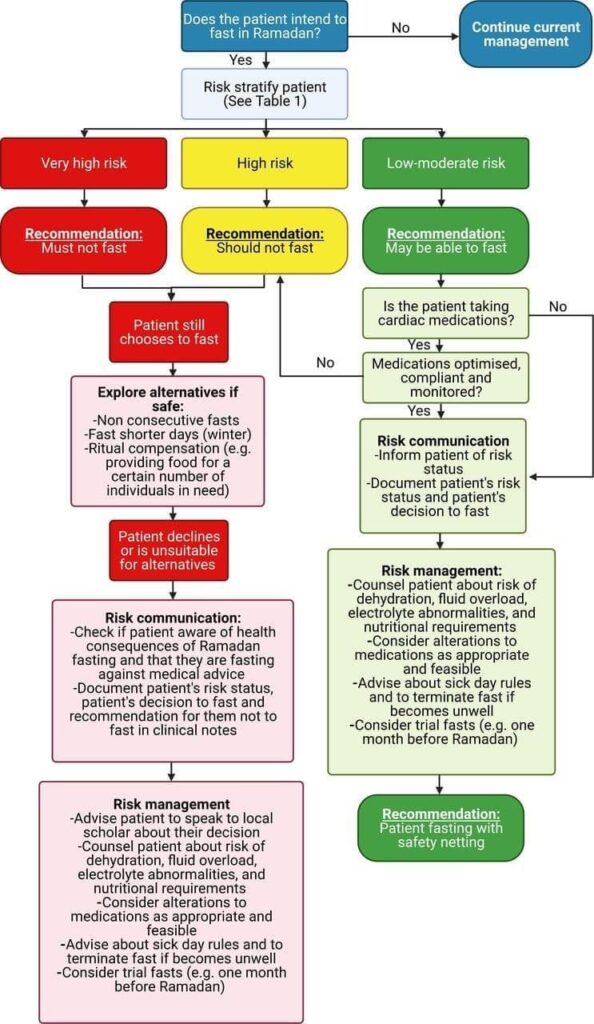12/03/2024
12/03/2024

Kuwait City, Mar 12: In a recent interview with Dr. Rajesh Rajan, a senior cardiologist and esteemed figure in the field of cardiovascular health, we discussed the recommendations for patients with cardiovascular disease during Ramadan fasting.
During the interview, Dr. Rajan highlighted several important factors and therapies to consider for patients with cardiovascular conditions during Ramadan fasting. Patients are categorized into three risk levels: high risk, moderate risk, and low risk. High and moderate risk patients are advised against fasting, while low risk patients are permitted to fast.
1. Fasting-associated dehydration may lead to electrolyte abnormalities, which could be life-threatening in patients with unstable arrhythmias, inherited arrhythmia syndromes (e.g., long QT or Brugada syndrome), or those on certain medications.
2. Dehydration is a risk factor for the recurrence of orthostatic intolerance syndromes.
3. Cardiac medications can induce hypotension, potentially causing syncope, especially in elderly patients with impaired baroreflexes. This risk may be exacerbated by dehydration or changes in medication dosing to accommodate fasting.
4. Ramadan fasting has been shown to decrease blood pressure in individuals using diuretics for hypertension, without complications.
5. Sleep cycle and eating disturbances during Ramadan fasting may increase the incidence of atrial fibrillation.
6. Medication adjustments should be made cautiously, considering once-daily or long-acting formulations, and avoiding changes in established therapies if possible.
7. Patients with hypertension, coronary artery disease, or recent acute coronary syndrome should have their blood pressure, kidney function, and medications reviewed by healthcare providers before Ramadan fasting.
8. Patients with well-controlled blood pressure and who are compliant with medications are considered low-moderate risk for fasting.
9. Patients within a 6-week period of an acute coronary syndrome or cardiac surgery are advised not to fast.
10. Patients with severe heart failure (LVEF ≤35%) or advanced heart failure are considered high and very high risk for fasting, respectively.
11. Patients with pacemakers are considered low-moderate risk if their device parameters are stable and they have no electrolyte abnormalities.
12. Patients with cardiac resynchronization therapy or implantable cardioverter defibrillators are considered at least high risk for fasting.
13. Pregnant patients with cardiovascular conditions should consult their specialist team regarding Ramadan fasting.
14. Patients with heart failure with reduced ejection fraction (HFrEF) who closely monitored their condition during Ramadan fasting did not experience worsening symptoms. Non-compliance with fluid restrictions and medications increased the risk of worsening symptoms.
15. Patients with Type 2 Diabetes or heart failure on Sodium-glucose cotransporter 2 inhibitors (SGLT2i) should be initiated at a low dose, in the evening, and at least one month before Ramadan for patients observing fasting.
16. Patients with long QT syndrome should carefully avoid dehydration.
17. Patients with hypertrophic obstructive cardiomyopathy (HOCM) should remain well hydrated to reduce the occurrence of potentially life-threatening symptoms.
To ensure a safe fasting experience, the study recommends:
A. Medical evaluation before Ramadan.
B. Medication management and adjustment.
C. Nutritional guidance and maintaining a balanced diet.
D. Engaging in light to moderate physical activity.
E. Regular monitoring of blood pressure, blood sugar levels, and overall well-being.
Open communication between patients and healthcare providers is crucial for personalized advice and decision-making.

Dr. Rajan is a renowned Indian cardiologist at Al Amiri Hospital Kuwait and Chairman of the Indian Association of Clinical Cardiologists. Dr. Rajan also holds prestigious positions as the current President of the Association of MD Physicians and the Managing Editor of the esteemed Annals of Clinical Cardiology Journal by Wolters Kluwer. His contributions to the medical community are highly regarded, with notable achievements that include the invention of the RHF Risk Score calculator for heart failure patients and the development of Rajan's and Kotevski's modified Lipton's classification. Beyond his groundbreaking research, Dr. Rajan has garnered recognition through various Fellowships from esteemed institutions such as the Royal College of London, Edinburgh, Ireland, and Glasgow. Moreover, he has been honored as a Fellow of the American College of Cardiology, the European Society of Cardiology, and the American Heart Association, further highlighting his expertise and commitment to cardiovascular health.


